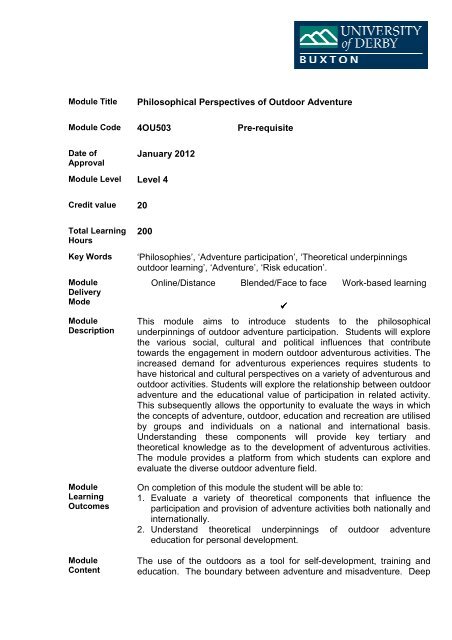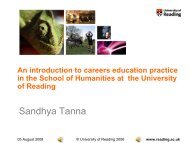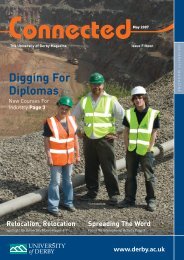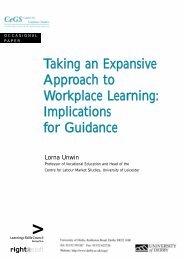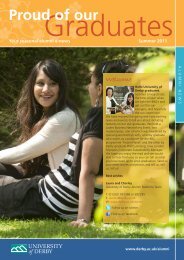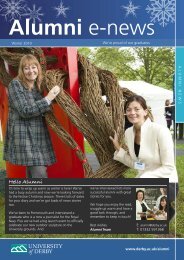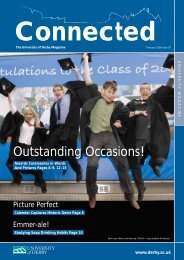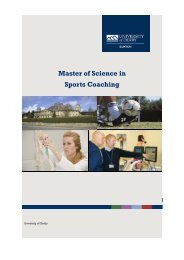Philosophical Perspectives of Outdoor Adventure - University of Derby
Philosophical Perspectives of Outdoor Adventure - University of Derby
Philosophical Perspectives of Outdoor Adventure - University of Derby
Create successful ePaper yourself
Turn your PDF publications into a flip-book with our unique Google optimized e-Paper software.
Module Title<br />
<strong>Philosophical</strong> <strong>Perspectives</strong> <strong>of</strong> <strong>Outdoor</strong> <strong>Adventure</strong><br />
Module Code 4OU503 Pre-requisite<br />
Date <strong>of</strong><br />
Approval<br />
January 2012<br />
Module Level Level 4<br />
Credit value 20<br />
Total Learning<br />
Hours<br />
Key Words<br />
Module<br />
Delivery<br />
Mode<br />
Module<br />
Description<br />
Module<br />
Learning<br />
Outcomes<br />
Module<br />
Content<br />
200<br />
‘Philosophies’, ‘<strong>Adventure</strong> participation’, ‘Theoretical underpinnings<br />
outdoor learning’, ‘<strong>Adventure</strong>’, ‘Risk education’.<br />
Online/Distance Blended/Face to face Work-based learning<br />
<br />
This module aims to introduce students to the philosophical<br />
underpinnings <strong>of</strong> outdoor adventure participation. Students will explore<br />
the various social, cultural and political influences that contribute<br />
towards the engagement in modern outdoor adventurous activities. The<br />
increased demand for adventurous experiences requires students to<br />
have historical and cultural perspectives on a variety <strong>of</strong> adventurous and<br />
outdoor activities. Students will explore the relationship between outdoor<br />
adventure and the educational value <strong>of</strong> participation in related activity.<br />
This subsequently allows the opportunity to evaluate the ways in which<br />
the concepts <strong>of</strong> adventure, outdoor, education and recreation are utilised<br />
by groups and individuals on a national and international basis.<br />
Understanding these components will provide key tertiary and<br />
theoretical knowledge as to the development <strong>of</strong> adventurous activities.<br />
The module provides a platform from which students can explore and<br />
evaluate the diverse outdoor adventure field.<br />
On completion <strong>of</strong> this module the student will be able to:<br />
1. Evaluate a variety <strong>of</strong> theoretical components that influence the<br />
participation and provision <strong>of</strong> adventure activities both nationally and<br />
internationally.<br />
2. Understand theoretical underpinnings <strong>of</strong> outdoor adventure<br />
education for personal development.<br />
The use <strong>of</strong> the outdoors as a tool for self-development, training and<br />
education. The boundary between adventure and misadventure. Deep
slow adventure versus shallow fast adventure experiences. <strong>Adventure</strong><br />
as an educational alternative. Motivational theories <strong>of</strong> participation;<br />
adventure participation, thrill seeking, human need for exploration.<br />
Socio-political issues surrounding the development <strong>of</strong> adventure<br />
internationally. Cultural issues and perspectives <strong>of</strong> outdoor adventure<br />
participation. Self-awareness and reflection through outdoor adventure<br />
experiences.<br />
Module<br />
Learning and<br />
Teaching<br />
Methods<br />
Module<br />
Assessment<br />
Method<br />
Scheduled learning and teaching 36 hours 18% Category 1<br />
activities<br />
Guided independent study 160 hours 80% Category 2<br />
Guest speakers 4 hours 2% Category 1<br />
Total 200 hours 100%<br />
Assessment weighting 100% Coursework<br />
CW 1: 100% Learning outcomes 1 and 2<br />
Review philosophical and theoretical concepts that relate to outdoor<br />
adventure participation at a national and international level. Written<br />
essay (2000 words).<br />
Formative feedback- student centred tasks will be facilitated during the<br />
module allowing for continuous feedback and reflection to enhance the<br />
learning process.<br />
Reading list<br />
Key texts<br />
Extended<br />
reading<br />
Gill, T. (2007) No Fear: Growing up in a risk averse society. London,<br />
Calouste Gulbenkian Foundation.<br />
Mc Namee, M. (2007) Philosophy, Risk and <strong>Adventure</strong> Sports. London,<br />
Routeledge.<br />
Bowden, R. (2003) Tourism: our impact on the planet. London, Hodder<br />
Wayland Limited.<br />
Henderson, R. (1999) The place <strong>of</strong> deep ecology and ecopsychology in<br />
adventure education. In Miles, C. J. and Priest, S. (Eds.) <strong>Adventure</strong><br />
Programming. State College, PA: Venture Publishing.<br />
Hopkins D & Putnam R (1993) Personal Growth Through <strong>Adventure</strong>,<br />
Fulton, London<br />
Day J (2000) Recreation, Sport Planning and Design Human Kinetics,<br />
Champaign<br />
Inskeep E (1991) Tourism Planning Van Rostrand Reinhold<br />
Miles J & Priest S <strong>Adventure</strong> Programming Venture Publishing<br />
Pennsylvania<br />
Mortlock, C. (1984) The adventure alternative. Cumbria: Cicerone Press.<br />
Mortlock, C. (2001) Beyond <strong>Adventure</strong>. Cumbria: Cicerone Press.<br />
Naess, A. (1989) Ecology, community and lifestyle. Cambridge<br />
<strong>University</strong> Press.<br />
Torkildsen G (2000) Leisure and Recreation Management E & F Spoon,<br />
London<br />
Baker, M. (2005) Landfullness in <strong>Adventure</strong>-Based Programming:
Journals<br />
Promoting Reconnection to the Land. Journal <strong>of</strong> Experiential Education.<br />
27(3), 267-276.<br />
Barnes, P. (2004) The Role <strong>of</strong> Authenticity-Is <strong>Outdoor</strong> Education the<br />
‘Real Thing’? Horizons. Winter 28, 4-7.<br />
Bowles, S. (2008)Some other ways not taken. In Becker, P. & Schirp, J.<br />
(eds) Other ways <strong>of</strong> learning. Marburg, bsjp 245-276.<br />
Brookes, A. (1993) Deep and Shallow outdoor education: can we tell<br />
the difference? The <strong>Outdoor</strong> Educator June, pp 8-16.<br />
Hattie, J., Marsh, H.W., Neill, J.T. (1997) <strong>Adventure</strong> Education and<br />
Outward Bound: Out <strong>of</strong> Class Experiences That Make a Lasting<br />
Difference. Review <strong>of</strong> Educational Research 67(1), 43- 87.<br />
Higgins, P. (2003) <strong>Outdoor</strong> Education in the UK: A journey with an<br />
uncertain destination? In Humberstone, B. Brown, H. and Richards, K.<br />
(eds) Whose Journeys? The <strong>Outdoor</strong>s and <strong>Adventure</strong> as Social and<br />
Cultural Phenomena. Penrith: The Institute for <strong>Outdoor</strong> Learning. 131-<br />
145.<br />
Knapp, C. E. & Smith, T. E. (2005) Exploring the power <strong>of</strong> Solo,<br />
Silence and Solitude. Boulder: Association for Experiential Education.<br />
Loynes, C. (1998) <strong>Adventure</strong> in a bun. Journal <strong>of</strong> Experiential Education;<br />
21(1) 35-39.<br />
Martin, P. (2004) <strong>Outdoor</strong> adventure in promoting relationships with<br />
nature. Australian Journal <strong>of</strong> <strong>Outdoor</strong> Education. 8(1), 20- 28<br />
Rubens, D. (1999) Effort or Performance? Keys to Motivated Learners in<br />
the <strong>Outdoor</strong>s, Horizons, 4, 26-28.<br />
Taniguchi, S. T., Freeman, P. A. & Richards, A. L. (2005) Attributes <strong>of</strong><br />
meaningful learning experiences in an outdoor education program.<br />
Journal <strong>of</strong> <strong>Adventure</strong> Education and <strong>Outdoor</strong> Learning. 5(2), 131-144.<br />
Thomas, G. (2004) Skills and thrills in outdoor environmental<br />
education: A contradiction or beautiful tension? International <strong>Outdoor</strong><br />
Education Research Conference. La Trobe <strong>University</strong> Bendigo, Victoria,<br />
Australia, July 6-9,


